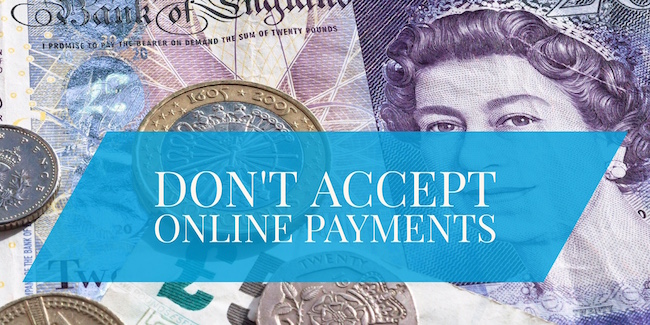I recently booked my room for a destination wedding in Costa Rica. And, it was a bit of a headache. In order to book the room, I was emailed a form, which I then had to print or fill-out electronically, and then email it back to the hotel, which would then charge my credit card after they received the email and entered the payment information into their system. Wouldn’t it make sense for the hotel to accept online payments? After all, they’re fast and convenient for both the business and customer.
While I didn’t ask the hotel why this was the booking and payment system they preferred, it’s still not out of the norm for businesses to reject online payments. Sometimes it could because it’s a cash-based business or the owners aren’t aware of online payments, but usually it’s because of the following 8 reasons.
Table of Contents
Toggle1. It can get expense.
Arguably the most common argument against accepting online payments is that there are fees involved. This depends on how exactly you process transactions, but the most obvious is being charged processing fees. These fees may appear insignificant at first, but they can add-up and eventually cut-into your profits.
It’s also normal for businesses to pay for merchant services, monthly statements, interchange and chargeback fees, and PCI compliance charges. There’s also the cost involved with setting up and operating an online payment system, either by hosting your own site, purchasing software, or paying a third party gateway. And, if you’re dealing with global customers, there could be hefty transaction fees.
If your business relies on smaller purchases, those fees may not worth the cost of accepting online payments.
2. Increased security concerns.
While there are laws and technological advancements to help avoid cybersecurity threats, online transactions can increase the chances of fraud. For example, you customer’s personal or account information and credit card number are exposed online whenever they make a purchase. This means that a hacker can steal their identity. Furthermore, customers are also concerned about maintaining their anonymity when sharing their billing information.
Because of this, a majority of banks, card processors, and online sales vendors will require you to undergo an annual verification of your credit card processing software and practices in order to retain your account.
3. Fraud liability.
Since you can’t verify your customer’s identify by checking their ID, there have been instances where merchants are held responsible for accepting a fraudulent transaction. In other words, as described in this Signifyd post, “If a merchant accepts an order online that is later deemed fraudulent, it is the merchant’s responsibility to refund the customer. The cardholder’s issuing bank will collect on behalf of the cardholder.”
Unfortunately, most online business owners aren’t aware of fraud liability, which can end-up being a costly experience. This is mainly because the total cost to the merchant for accepting one fraudulent transaction is often more than twice the cost of the transaction themselves. This is since they cannot recover the original fraudulent shipment, and must also refund the scammed customer.
4. You don’t have complete control.
If you’re relying on a third party payment gateway or app, then you’re at the mercy of the payment processor. This can become a popular if the card processor updates the app, software, or crashes. In short, if the processor goes down, so does your payment platform.
5. It’s adding additional work.
When you accept online payments, you need to plan for extra bookkeeping to develop, implement, and maintain a strategy to track and balance everything from card payments, eCheck payments, PayPal transfers, credit card processing rates, and any other fees that are associated with merchant accounts and payment gateways.
This can end-up costing you a lot of time and resources, which takes you away from more important tasks like growing your business.
6. Delays access to cash.
While technology is speeding up the availability of funds, and you can negotiate longer payment terms with vendors and suppliers; it’s still common for businesses to have to wait several days or weeks before they can access their funds. That’s a major concern when cash flow is a problem.
It’s also a concern when you don’t ship goods or release intellectual property until a payment has been cleared. That lag time may lead customers to jump ship to a competitor who either accepts cash or has a faster payment platform.
7. Integration may be a hassle.
It’s no secret that proper online payment platforms are expensive. They’re also accustomed to hardware and software problems when the platform won’t integrate with a website. For example, a PSP may not be able to link with a payment system, which ultimately delays payments or even losses transactions. In short, sometimes the online payment system doesn’t play nice with your website or other systems, like invoicing or accounting software.
To make things even more complicated, we live in an omnichannel world where customers expect to add an item to their shopping cart on their desktop and complete the transaction on their mobile device at a later time. That means that you need to have a payment platform that is responsive by working across multiple devices. Again, that’s not only pricey, it may not work with your existing systems.
8. Lack of customer service.
It’s great that we live in world where you don’t have to sit on the phone waiting to talk to a rep or technician thanks to email and direct messages. But sometimes you do have to talk to an actual human being, like if a pending payment suddenly disappeared.
Many online payment platforms don’t offer 24/7 customer support. That’s not to say that they have sub-par support. In fact, most of them have outstanding customer service. The problem is that there will be situations where you need to talk someone and there’s isn’t anyone there to walk you through the problem.











